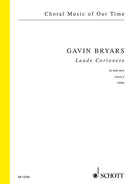| 作曲者 | Gavin Bryars (b. 1943) |
| タイトル | Laude Cortonese, vol. 5 |
| 出版社 | Schott・ショット |
| シリーズ名 | Choral Music of Our Time |
| 楽器編成 | male choir |
| 品番 | 9790220133091 |
| 難易度 | 中級〜上中級 |
| 言語 | イタリア語 |
| 形状 | 16 ページ・中綴じ |
| 演奏時間 | 8分 |
| 作曲年 | 2006年 |
| 出版年 | 2012年 |
| 出版番号 | ED 13230 |
| ISMN | 9790220133091 |
| その他 | for male choir |
My collection of laude has its origins in the world of early music, being based in spirit and feeling on the unaccompanied vocal “laude” found in a collection from 13th century Cortona. The people who originally sang such things - the ‘laudesi’ - banded together in confraternities but were not usually associated with any particular church and this music was not part of any liturgy. The first laude that I wrote were, like the mediaeval originals, for unaccompanied voice - for the soprano Anna Maria Friman. I then wrote some for two voices, adding the tenor John Potter, and some for three sopranos, the Trio Mediaeval. Gradually I added more for other vocal combinations as well as some with instrumental accompaniment. But I do return from time to time to the ‘purer’ solo or duo lauda. In 2006 I wrote a number of pieces for the Estonian National Men’s Choir (RAM) chiefly through my friendship and collaborations with its conductor Kaspars Putnins who, as well as conducting the Latvian Radio Choir, was director of RAM. I wrote two laude for them. Lauda 31 was completely new, while Lauda 32 is a new version of Lauda 19 “Omne homo”. Both make full use of the special quality of the Estonian choir and Lauda 32 in particular deliberately aims to have the sound of singers in a Russian Orthodox tradition.Whatever vocal approach I use for setting lauda texts, I treat them with great respect in relation to the original lauda. I adhere as far as possible to the same number of notes to a syllable that are in the mediaeval versions, frequently following the melodic contours and sometimes quoting individual phrases. I still relish the challenge of writing vocal music which is quite exposed, and which retains something of the austerity of the original. Gavin Bryars (2012)
Lauda 31 (Ogn'om canti) - Lauda 32 (Omne homo)



